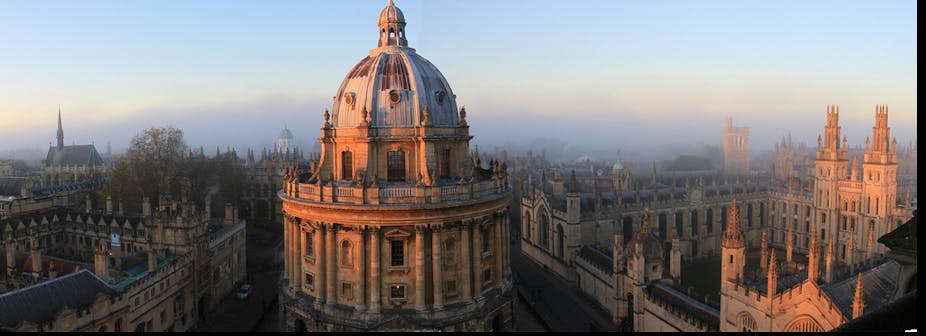The most feared exam in the world has been dropped. For over a century those hoping to study at All Souls College in Oxford opened an envelope with trepidation to discover just one word inside. They then had three hours to write about it.
Some of the world’s sharpest minds still shudder at the memory of having to write about “miracles”, “possessions”, “water”, or even “novelty”.
But future generations have been saved that fate, now academics have decided it isn’t the best way to assess candidates.
For one last time, though, The Conversation decided to test a Quondam Fellow of All Souls. Professor John Crossley, the word inside your envelope is “over”. Your time starts now.
‘Over’. An Essay.
Cricket is not a topic one naturally associates with All Souls, the Oxford college with neither undergraduates nor graduate students.
At least the word is not germane in its literal sense, though I did play cricket for the college once, only to be defeated by Merton College.
But is it cricket, in the metaphorical sense, to do away with the examination that requires an essay on one word?
And is it cricket not to use the word in the course of the essay?
I didn’t exactly climb the wall to get into All Souls, but I did not have to do the fellowship examination. Nor did most of the other fellows of the college, for there are more than half a dozen categories and the examination fellows are far outnumbered.
They do, however, ensure that there is a good distribution of ages across the membership of the college.
After now long-forgotten mediocrity, in the late nineteenth century wisdom prevailed and the college was slowly rolled into the intellectual — and political — powerhouse that it has become.
The range of intellectual disciplines has expanded from theology and law to cover the gamut of academic disciplines from algebraic topology to zoology and zoroastrianism.
Science has grown and mathematicians now seem close to exceeding their quota.
Australians and others from across the seas are, or have been, present in numbers far greater than one would have expected even fifty years ago.
The college’s move in 1966 to admit visiting fellows — yet another class of fellow for which there is no examination, though there is rigorous selection — seems to have been the right one.
Admitting graduate students would have made the college like the several new graduate colleges, perhaps not outclassing others.
As it is, the visiting fellows, who descend from the skies each term from numerous countries, enrich the whole of Oxford with their interactions.
They make contributions that do not blow out the government’s budget, indeed do not touch it, but their wisdom and counsel is beyond price.
Further, for all the gross myths, All Souls is more geared to the real world than most Oxford colleges.
Lawyers prevail, but through the years many politicians return to the college, as I do, in the role of Quondam, “sometime”, Fellows.
Awareness of political events, local and international, surpasses that found virtually anywhere else.
Examination fellows are part of this, but have perhaps a superfluity of choices.
Through the last fifty years, of those taking an academic route, an increasing number have chosen to do a doctorate; of the others many have gone on to very varied careers from the law to the arts.
The examination, including the essay, assumes a certain amount of knowledge ranging extensively, but the emphasis is rather on intelligence, understanding and communication.
And the assessment doesn’t stop in the exam room. Those who deemed worthy of a more in-depth look are invited to dinner. One applicant’s story explains the “one last romantic, mystical trial: cherry pie is served for pudding, to see what the candidates do with the stones”.
This is is not excessively apocryphal: an invitation to dine is not, as one commentator put it, “simply a courtesy extended to those who are committed enough to sit the papers”.
The point, which A. L. Rowse, himself an examination fellow, seems to have missed, is that you should be able to cope with unprecedented situations.
Sitting down to dinner as a candidate is a lottery: you never know next to whom you will sit, what their interests are and what prejudices — yours as well as theirs — you will have to conquer.
Perhaps the one thing that I value above all others from All Souls is the precise, felicitous and elegant use of English.
Certainly there can be too much pedantry, but clarity of expression so much enhances debate.
So now I am at an end, and although I haven’t used the word, nevertheless there is a synonym, paraphrase or allusion in every sentence, and neither I, nor All Souls, is finished yet.
It’s not over.

